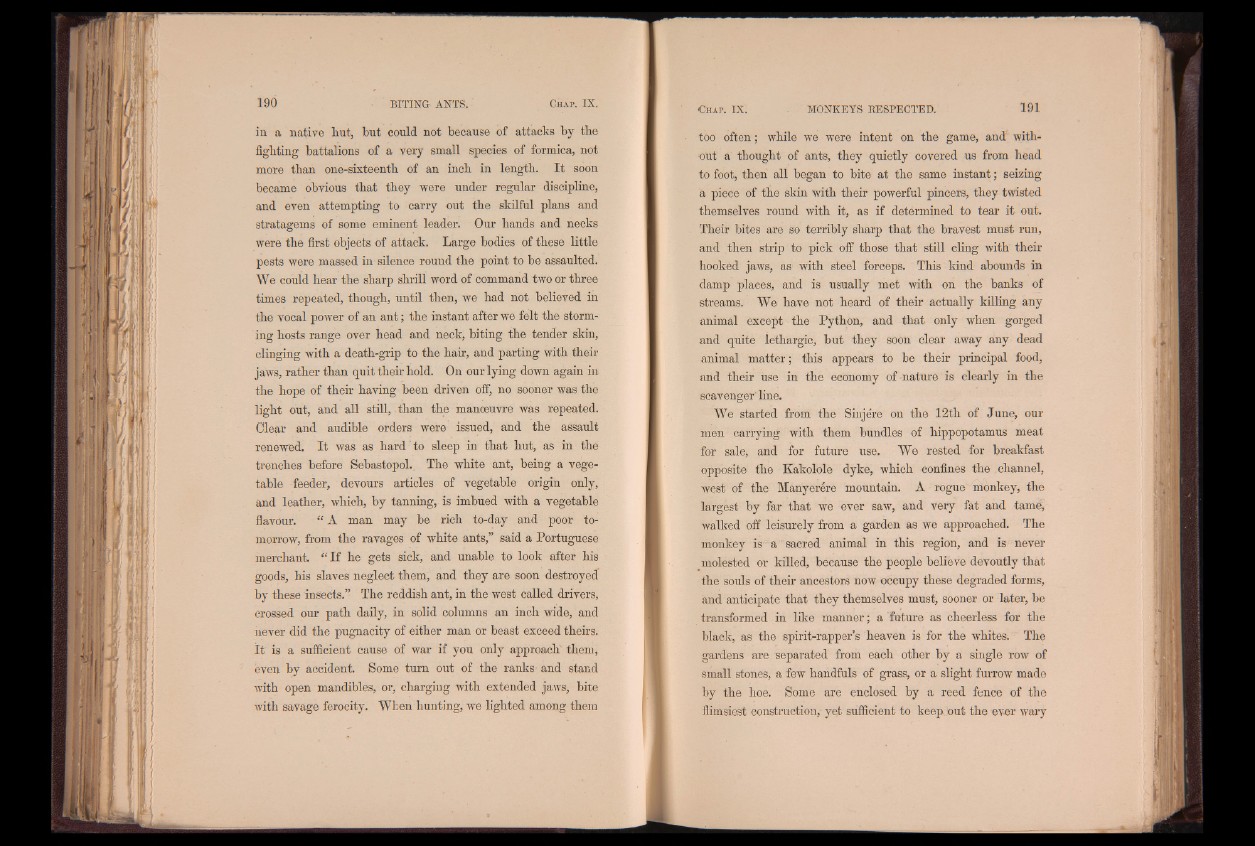
in a native hut, but could not because of attacks by the
fighting battalions of a very small species of formica, not
more than one-sixteenth of an inch in length. I t soon
became obvious that they were under regular discipline,
and even attempting to carry out the skilful plans and
stratagems of some eminent leader. Our hands and necks
were the first objects of attack. Large bodies of these little
pests were massed in silence round the point to be assaulted.
We could hear the sharp shrill word of command two or three
times repeated, though, until then, we had not believed in
the vocal power of an ant ; the instant after we felt the storming
hosts range over head and neck, biting the tender skin,
clinging with a death-grip to the hair, and parting with their
jaws, rather than quit their hold. On our lying down again in
the hope of their having been driven off, no sooner was the
light out, and all still, than the manoeuvre was repeated.
Clear and audible orders were issued, and the assault
renewed. I t was as hard to sleep in that hut, as in thé
trenches before Sebastopol., The white ant, being a vegetable
feeder, devours articles of vegetable origin only,
and leather, which, by tanning, is imbued with a vegetable
flavour. p A man may be rich to-day and poor tomorrow,
from the ravages of white ants,” said a Portuguese
merchant. “ If he gets sick, and unable to look after his
goods, his slaves neglect them, and they are soon destroyed
by these insects.” The reddish ant, in the west called drivers,
crossed our path daily, in solid columns an inch wide, and
never did the pugnacity of either man or beast exceed theirs.
I t is a sufficient cause of war if you only approach them,
even by accident. Some turn out of the ranks- and stand
with open mandibles, or, charging with extended jaws, bite
with savage ferocity. When hunting, we lighted among them
too often; while we were intent on the game, and without
a thought of ants, they quietly covered us from head
to foot, then all began to bite at the same instant; seizing
a piece of the skin with their powerful pincers, they twisted
themselves round with it, as if determined to tear it out.
Their bites are so terribly sharp that the bravest must run,
and then strip to pick off those that still cling with their
hooked jaws, as with steel forceps. This kind abounds in
damp places, and is usually met with on the banks of
streams. We have not heard of their actually killing any
animal except the Python, and that only when gorged
and quite lethargic, but they soon clear away any dead
animal matter; this appears to be their principal food,
and their use in the economy of-nature is clearly in the
scavenger' line.
We started from the Sinjere on the 12th of June, our
men carrying with them bundles of hippopotamus meat
for sale, and for future use. We rested for breakfast
opposite the Kakolole dyke, which confines the channel,
west of the Mhnyerere mountain. A rogue monkey, the
largest by far that we ever saw, and very fat and tame,
walked off leisurely from a garden as we approached. The
monkey is a sacred animal in this region, and is never
molested or killed, because the people believe devoutly that
the souls of their ancestors now occupy these degraded forms,
and anticipate that they themselves must, sooner or later, be
transformed in like manner; a future as cheerless for the
black, as the spirit-rapper’s heaven is for the whites. The
gardens are separated from each other by a single row of
small stones, a few handfuls of grass, or a slight furrow made
by the hoe. Some are enclosed by a reed fence of the
flimsiest construction,' yet sufficient to keep, out the ever wary